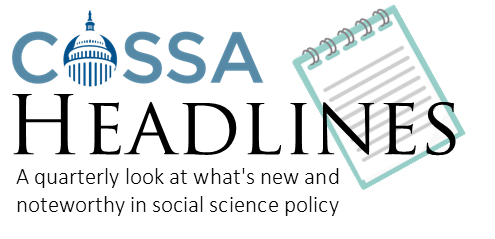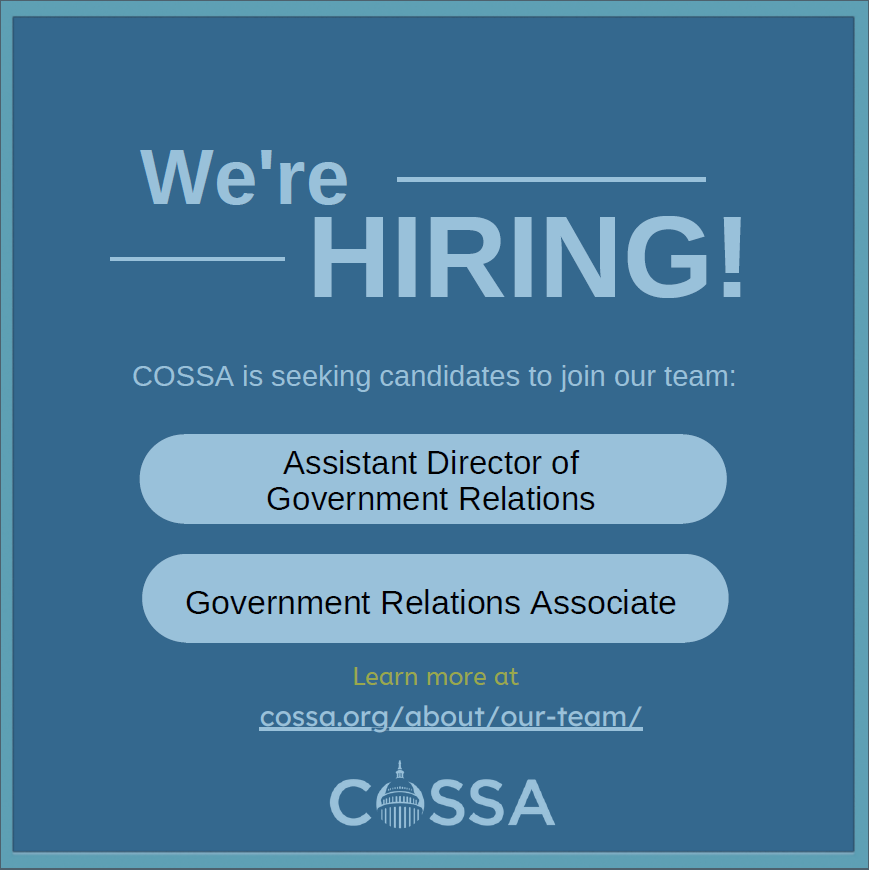Issue 11 (June 7)
National Academies Release New Report on Ontologies in the Behavioral Sciences
The National Academies of Sciences, Engineering, and Medicine (NASEM) has released a new consensus study report titled Ontologies in the Behavioral Sciences: Accelerating Research and the Spread of Knowledge. The report offers a description of ontologies, or frameworks for organizing existing knowledge, and ways they can be used to support behavioral science. In addition, the report offers several recommendations for science stakeholders to best use ontologies to advance behavioral science research, including federal agencies and professional organizations. Some of these recommendations include:
- The National Institutes of Health (NIH) and National Science Foundation (NSF) should create agendas for advancing behavioral science ontologies while drawing on ideas generated from other scientific domains and the international scientific community.
- NIH, NSF, and other science agencies should fund opportunities to support the development of behavioral science ontologies.
- The White House Office of Science and Technology Policy (OSTP) should develop a report on how a shared concept for behavioral science can be implemented across federal science agencies using ontologies developed by other agencies.
- Organizations such as COSSA, the Federation of Associations in Behavioral and Brain Sciences (FABBS) and similar organizations should coordinate ontology development across academic and professional organizations.
- Organizations with publications, such as the American Psychological Association (APA) and the Association for Psychological Science (APS), should standardize vocabularies and reporting standards for their behavioral science journals.
- Professional organizations should make strategies to integrate ontology development into graduate-level teaching when possible.
The full report can be found on the National Academies’ website.
Headlines Moving to Quarterly Schedule
Headlines, one of COSSA’s signature members-only programs, will be adopting a new quarterly schedule. The next scheduled Headlines webinar will be held on August 11 and will feature a Deep Dive with Erwin Gianchandani, the Director of the new Technology, Innovation, and Partnerships (TIP) Directorate at the National Science Foundation, where we will discuss updates related to the standing up of the new Directorate. You can register for the quarterly webinars for 2022 here.

COSSA is Hiring
Do you ❤ Social Science as much as we do? Consider joining the COSSA team! We are currently searching for our next Assistant Director of Government Relations and/or Government Relations Associate. Interested advocates with experience ranging from one to five or more years should check out the job descriptions here. Come be part of a community of advocates working to champion the social and behavioral sciences!
Busy June Ahead for Lawmakers
Congress returns from Memorial Day recess with renewed pressure to enact legislation to stem gun violence in the United States following the most recent mass shootings over the last few weeks. House leaders have promised a vote on one such package (H.R. 7910) later this week; however, the Senate requires a super majority (60 votes) in order to pass such a bill, making the bill a much bigger lift.
In addition, as previously reported, Congress is also steeped in the annual appropriations process for fiscal year (FY) 2023. While earlier in the year it was hinted that markups on the 12 annual spending bills could begin in the House this month, none have been scheduled to date (although it is still possible). Among the holdups is agreement on top-line funding levels for next year. Until the House and Senate Appropriations Chairs agree to total discretionary spending levels for FY 2023, the subcommittees and bills under their jurisdiction remain in a holding pattern. Most observers agree that FY 2023 will be a challenging funding year for just about every account, including science, with federal funds being limited and lawmakers’ priorities continuing to grow. While it is common for the annual appropriations bills to get delayed until the fall or even the next calendar year, especially in an election year, a number of top appropriators are retiring at the end of this year (more here and here), adding pressure to complete the bills thus securing their legacies. The next several weeks leading up to the August recess will be critical for determining a path forward for FY 2023 spending bills.
Another bill closely watched by science advocates is the America COMPETES Act (H.R. 4521), a massive legislative package aimed at advancing the U.S. STEM enterprise and shoring up U.S. scientific competitiveness, especially with respect to China. A conference committee between the House and Senate has been working behind closed doors for several weeks to negotiate to compromise, which some hope to secure before the summer break. Given the many competing priorities on Capitol Hill, it is unclear whether that timing will stick.
Adam H. Russell Named ARPA-H Acting Deputy Director
On May 25, Secretary of the Department of Health and Human Services (HHS) Xavier Becerra formally announced the establishment of the Advanced Research Project Agency for Health (ARPA-H) within the National Institutes of Health (NIH) along with the appointment of Adam H. Russell, Ph.D. as the Acting Deputy Director of ARPA-H. Russell comes to ARPA-H from the University of Maryland’s Applied Research Laboratory for Intelligence and Security and brings more than a decade of experience as a Program Manager at the Intelligence Advanced Research Projects Agency (IARPA) and the Defense Advanced Research Projects Agency (DARPA). Russell also has an extensive background in the social sciences, holding a bachelor’s degree in Cultural Anthropology from Duke University and a master’s and doctorate in Social Anthropology from Oxford University. Russell, who is the first ARPA-H official to be named, will assume his new role on June 6.
National Academies Seeking Director for Board on Human-Systems Integration
The National Academies of Sciences, Engineering, and Medicine (NASEM) has announced the search for a new director for the Board on Human-Systems Integration (BOHSI), a major program housed in the Division of Behavioral and Social Sciences and Education (DBASSE). The director of BOHSI is responsible for managing all programs under the Board’s purview including human capital management, cybersecurity, and other human factors research. In addition, the director is responsible for leading communications, managing staff, and fostering partnerships with federal agencies, industry, and professional associations. More information on how to apply is available on the NASEM website.
NSF Announces Partnership with SSRC’s Mercury Project
The Social Science Research Council (SSRC), a COSSA member, recently announced a new partnership between the National Science Foundation (NSF) Social, Behavioral, and Economic Sciences (SBE) Directorate and SSRC’s Mercury Project, a research initiative focusing on the impacts of and preventing the spread of public health misinformation. This partnership, called “Advance Scientific Knowledge about the Impact of Public Health Guidance,” will help advance evidence to inform decision making related to public health, especially within the context of the COVID-19 pandemic. Several of the hallmark programs within the SBE Directorate are participating in the partnership including Cultural Anthropology, Economics, Sociology, and others. Information about submitting proposals for the partnership is available on the NSF website.


